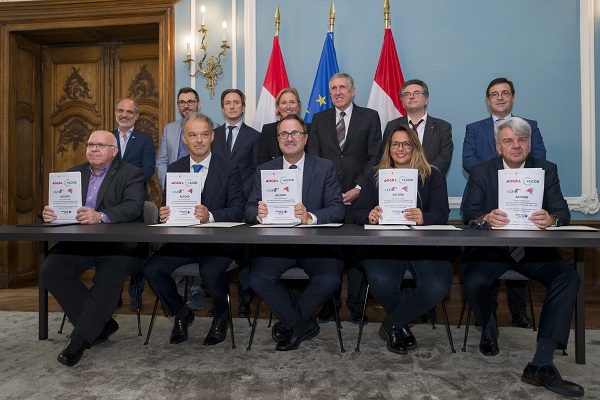 Credit: SIP / Jean-Christophe Verhaegen
Credit: SIP / Jean-Christophe Verhaegen
On Wednesday 28 September 2022, the Luxembourg Government signed a new tripartite agreement with the Luxembourg Employers' Association (Union des Entreprises Luxembourgeoises - UEL) and the LCGB, OGBL and CGFP trade unions.
The agreed measures, presented in a thirteen-page document, replace those decided at the end of March 2022 (Solidaritéitspak).
In light of the deteriorating economic situation, Luxembourg's Prime Minister Xavier Bettel once again brought together the social partners for preparatory bilateral meetings in August and September before convening the tripartite committee for renewed negotiations from 18 to 20 September 2022.
In the aforementioned thirteen-page summary, the new agreement is described as "historic"; it is expected to significantly curb inflation, support households and businesses through specific measures and promote and accelerate the energy and digital transition.
The government has allocated a budget of €1.1 billion for these measures in 2022 and 2023.
Some of the main measures in favour of households are:
- the wage indexation system will return to normal, although the social partners will reconvene for a new tripartite meeting should a third wage indexation be triggered, and the government would compensate businesses in this scenario;
- the increase in gas prices will be capped at 15% (in relation to the average price in September 2022) for households from October 2022 to December 2023. This measure applies to all customers with metres with a maximum gas flow of less than 65 m3 per hour;
- a freeze on electricity prices will apply from January to December 2023 for customers with an annual consumption of less than 25,000 kilowatt hours;
- the introduction of a 15 cent per litre reduction in heating oil prices from November 2022 until the end of December 2023;
- a temporary reduction in VAT rates from 1 January to 31 December 2023 (the standard VAT rate will drop from 17% to 16%; the intermediate rate from 14% to 13%; the reduced rate from 8% to 7%);
- an increase in the minimum wage from January 2023;
- the energy bonus of €200 to €400 per eligible household will continue into 2023;
- the State will contribute to the energy costs of retirement homes (already from 1 October 2022) for the duration of the tripartite agreement.
Some of the main measures in favour of businesses are:
- businesses will be compensated for rising energy costs through various aid schemes;
- existing aid schemes will be amended and extended according to the European Commission's Temporary Crisis Framework;
- the government will adapt the existing tax credit framework in order to promote investment in the digital and / or energy and ecological transition;
- the Labour Code will be amended to transpose the European directive on "Work Life Balance";
- businesses will be encouraged to produce their own energy. New tenders will be launched for solar panel installation subsidies;
- the government will encourage Luxembourgish businesses to get their energy supply directly from renewable energy suppliers through "power purchase agreements" (PPA).
Some of the main measures to accelerate the energy transition are:
- an increase in the "Klimabonus" financial aid relating to the replacement of fossil fuel boilers or electric heating by a heating installation based on renewable energy (valid for installations ordered between 1 November 2022 and 31 December 2022);
- a 25% increase in the "Kilmabonus" financial aid for solar panel installations (to be used by oneself or in the framework of an energy community; valid for orders between 1 January and 31 December 2023);
- a reduced VAT rate of 3% on new solar panels billed after 1 January 2023.
Should the economic and social context worsen significantly in 2023, a new tripartite meeting will be convened.








